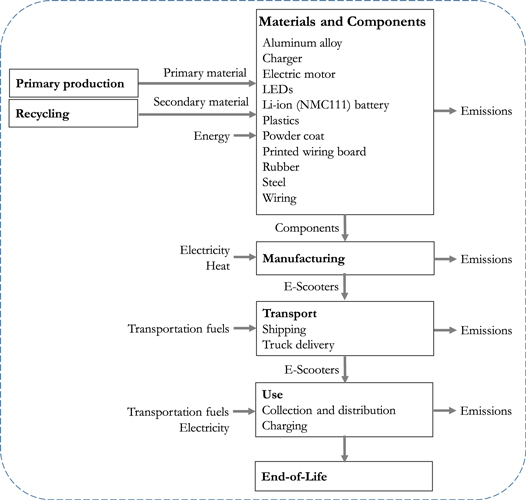In a first of its kind study, researchers have calculated that while e-scooters may be an effective solution to urban congestion, they do not necessarily reduce the environmental impact of a transportation system.
In fact, in most cases (65%), the complex analysis calculated a net increase in global warming impact when e-scooters displace existing modes in a transportation system.
The study focused on a comprehensive examination of environmental life cycle impacts, included impacts from materials and manufacturing, collection and distribution, charging, and disposal of e-scooters, as depicted below.

To estimate the displaced burdens from e-scooter usage, the study calculates that each passenger-mile on an e-scooter displaces 0.34 passenger-miles in a personal car, 0.11 passenger-miles on a public bus, and 0.08 miles on a bicycle.
The net increase in global warming impact is predominantly attributed to the materials and manufacturing of e-scooters (50%) and the impacts coming from collection and distribution of e-scooter schemes (43%).
The study also provided a number of recommendations on policies and practices that would reduce the total global warming, acidification, eutrophication, and respiratory impacts of shared dockless electric scooters, including:
- Allowing e-scooters to remain in public areas overnight, decreasing the automobile burdens associated with picking up fully charged or nearly charged e-scooters.
- Improved collection processes that reduce auto-miles travelled for collection and distribution.
- Enforce anti-vandalism policies that reduce e-scooter misuse or mistreatment which result in short lifetimes.
- Scooter companies taking meaningful action to reduce the life cycle burdens of their products.
While life cycle greenhouse has emissions associated with e-scooter use increased in 65% of base simulations, this dropped down to 35% when improved e-scooter collection processes were put in place, and only 4% when a two-year e-scooter lifetime was assumed.
This study, though somewhat difficult to digest due to its complexity, clearly demonstrates that there is the potential for e-scooters to increase life cycle emissions relative to the transportation modes that they displace.
However claims of environmental benefits from their use should be met with skepticism unless longer product lifetimes, reduced materials burdens, and reduced e-scooter collection and distribution impacts are achieved.
You can see the full study paper here.
Feature image: qut.edu.au
Become our friend
Find out more about Bicycle Network and support us in making it easier for people to ride bikes.


